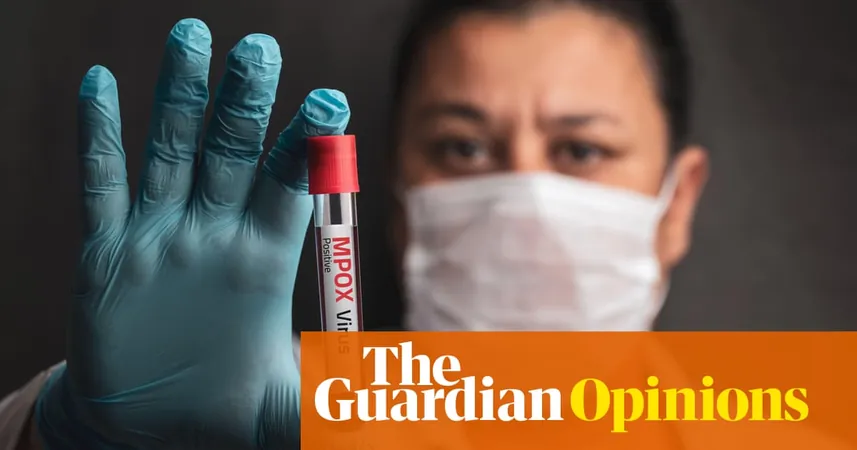
Urgent Action Required: The World Must Step Up Its Response to the Mpox Outbreak!
2024-11-21
Author: Jessica Wong
Introduction
Over the past year, a new strain of mpox, dubbed clade 1b, has surged significantly throughout central Africa. In response to this alarming trend, the World Health Organization (WHO) has declared mpox a public health emergency of international concern. In just the last month, cases of this strain have emerged in countries as diverse as the UK, the US, Germany, Sweden, and India.
The Importance of the First 100 Days
The initial 100 days of any outbreak are critical for determining its trajectory, a lesson underscored during the global response to the Covid-19 pandemic. During that time, international leaders launched the 100 Days Mission, committing to rolling out safe, effective, and affordable tests, treatments, and vaccines in a prompt manner when faced with new pandemic threats. Now, with the clock ticking since the WHO's declaration, the question remains: Has the world adequately risen to the challenge posed by mpox?
Current Responses and Challenges
While there have been some positive developments—such as proactive measures from the Africa Centres for Disease Control (Africa CDC) and quicker regulatory approvals for vaccines—these successes are insufficient. The reality is that even with ongoing vaccination campaigns, mpox continues to advance unchecked globally.
Testing Hurdles
One significant hurdle in combating mpox is the glaring lack of effective testing. Accurate and easily accessible tests are paramount for early detection and management of the disease. Currently, the only approved tests for mpox must take place in laboratories, creating significant barriers in remote regions. For instance, in the Democratic Republic of the Congo (DRC), only 36% of suspected cases have been tested, and delays of two to three days for results could lead to further transmission before the disease is even identified.
Emergency Testing Initiatives
To address this urgent need, the WHO has authorized a near-patient test for emergency use in affected countries. Africa CDC has taken proactive steps, securing 42,000 test kits to enhance local testing capacity. However, the prototypes evaluated for ease of use still lack the sensitivity required by WHO standards, meaning that effective detection remains a challenge.
The Need for Decentralization
At this 100-day marker, the absence of a WHO-approved antigen-based rapid diagnostic test is concerning. Without effective community-level testing, strategies to monitor and contain the outbreak will be severely hindered. The urgent need for decentralizing testing capabilities is evident, along with enhancing human resources and infrastructure to support this effort.
Treatment Developments
As for treatments, there is tentative hope that drugs intended for other diseases can be repurposed for use against mpox. Current clinical trials are exploring monoclonal antibody treatments, but unfortunately, no specific therapeutics for this new variant have materialized so far. For populations unable to access vaccines, the development of effective treatments is vital—a need that continues to be hampered by inadequate funding and a lack of political will.
Emerging Variant Risks
Moreover, the longer mpox persists in the population, the greater the risk of emerging variants that could undermine the effectiveness of current vaccines, tests, and treatments. It is imperative that global leaders commit to the equitable distribution of vaccines, accelerate the rollout of readily available testing methods, and invest in the development of new treatments.
Lessons from Past Emergencies
While progress has been made, the disheartening reality is that if we had internalized the lessons from prior emergencies, we might have mounted a swifter response. This marks the second mpox emergency in just two years. Had we advanced research and development efforts in 2022, we'd likely possess a more robust arsenal of tools today.
The Evolving Nature of Pandemic Risks
Pandemic risks are evolving; outbreaks are becoming increasingly common and cannot be seen as isolated incidents. Recent spillovers—like H5N1 avian influenza from animals to humans, record dengue fever outbreaks, and the spread of the Marburg virus—underscore this urgent truth.
The 100 Days Mission and Preparations
The 100 Days Mission serves as a crucial framework for safeguarding global populations in our interconnected world. However, preparations must begin long before the onset of an outbreak. It’s a marathon, not a sprint, which calls for unified efforts from every sector and level of government.
Call to Action
Together, we can change the course of pandemics, but are we prepared to make that commitment? The clock is ticking, and every moment counts in the fight against mpox and other looming health crises worldwide.

 Brasil (PT)
Brasil (PT)
 Canada (EN)
Canada (EN)
 Chile (ES)
Chile (ES)
 España (ES)
España (ES)
 France (FR)
France (FR)
 Hong Kong (EN)
Hong Kong (EN)
 Italia (IT)
Italia (IT)
 日本 (JA)
日本 (JA)
 Magyarország (HU)
Magyarország (HU)
 Norge (NO)
Norge (NO)
 Polska (PL)
Polska (PL)
 Schweiz (DE)
Schweiz (DE)
 Singapore (EN)
Singapore (EN)
 Sverige (SV)
Sverige (SV)
 Suomi (FI)
Suomi (FI)
 Türkiye (TR)
Türkiye (TR)